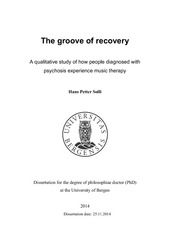The groove of recovery: A qualitative study of how people diagnosed with psychosis experience music therapy
Abstract
An understanding of recovery as a personal and social process has emerged within mental health systems, and is increasingly shaping international mental health policy and practice. In this critical and user-oriented perspective, recovery is understood as a way of living a meaningful, hopeful and contributory life, despite the limitations caused by illness, with the primary job of mental health professionals being to support these processes of change. The recovery perspective has to a small degree been explored in relation to music therapy, and implications for practice have only been vaguely described. The primary aim of this study was to explore the user perspective of people diagnosed with psychosis in order to understand how music and music therapy can contribute to the processes of recovery. A qualitative case study methodology was chosen as a framework, and a hermeneutical-phenomenological approach was utilized in order to understand participants’ experiences of music therapy. In addition, a qualitative meta-synthesis of previous studies containing first-person accounts was conducted. The findings in this thesis are presented in three articles. The first article presents the meta-synthesis, and discusses the results in relation to the theory of mental health recovery. Through a systematic literature review, 14 studies containing first-hand accounts of participants’ experiences with music therapy were identified. From the synthesis, a taxonomy of four areas of users’ experiences was identified: (1) Having a good time, (2) Being together, (3) Feeling, and (4) Being someone. Music therapy’s possible role in supporting the recovery processes of the person, and as part of recovery-oriented mental health services, were discussed. The second article is a multiple case study based on participatory observation and qualitative interviews of nine inpatients diagnosed and hospitalized at a psychiatric intensive care unit. The data were analysed using IPA (interpretative phenomenological analysis), and resulted in the development of a taxonomy of four super-ordinate themes: (1) Freedom, (2) Contact, (3) Well-being, and (4) Symptom relief. Mental health recovery, positive mental health and agency were proposed to constitute an appropriate framework for music therapy in mental health care. The third article is a single case study of a young man’s experiences of music therapy and the progressing processes of recovery. This was achieved by means of a qualitative case study that featured a description of the music therapeutic process based on participatory observation, alongside first-hand accounts of the participant’s subjective experiences gathered from interviews. The data were analysed using interpretative phenomenological analysis (IPA), and the presentation has a narrative form. The discussion highlights music therapy’s possibilities to afford agency and empowerment, promote a positive identity, develop positive relationships and expand social networks. The findings of the three articles are discussed in relation to established theory research and practice. Primary findings include that: music therapy was primarily experienced in relation to aspects of positive mental health and well-being and only occasionally in terms of symptom remission, music therapy supported the processes of recovery by affording a therapeutic and social arena that promoted participants’ agency and music therapy supported processes of recovery across multiple contexts in the participants’ lives.
Has parts
Paper 1: Solli, H. P., Rolvsjord, R., & Borg, M. (2013). Toward understanding music therapy as a recovery-oriented practice within mental health care: a meta-synthesis of service users’ experiences. Journal of Music Therapy, 50(4), 244–273. Full-text not availabnle in BORA. The published version is available at: http://dx.doi.org/10.1093/jmt/50.4.244Paper 2: Solli, H. P., & Rolvsjord, R. (2014). “The opposite of treatment”: a qualitative study of how patients diagnosed with psychosis experience music therapy. Nordic Journal of Music Therapy. Advance online publication. The article is available here: http://hdl.handle.net/1956/8768
Paper 3: Solli, H. P. (2014). Battling illness with wellness: a qualitative case study of a young rapper’s experiences with music therapy. Nordic Journal of Music Therapy. Advance online publication. The article is available here: http://hdl.handle.net/1956/8769
